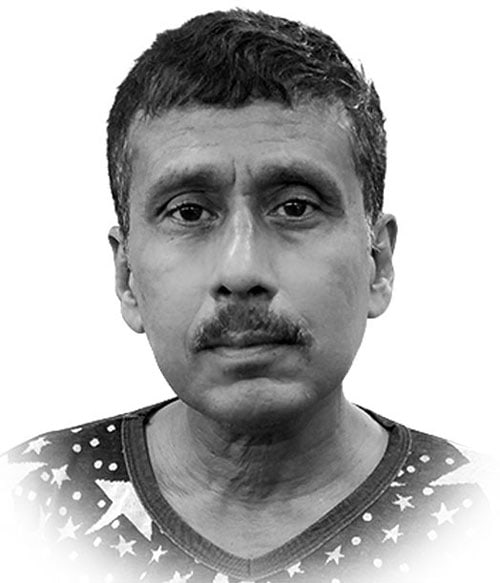IN the last three decades, different types of cases have been reported in newspa
pers which indicate the criminalisation of police. This is found in three forms:
(i). Policemen committing crimes themselves.
(ii). Policemen helping criminals in committing crimes and getting a share out of it.
(iii). Policemen resigning from the department and joining the militant groups engaged in killing, looting and abduction.In these three types, we have not included police corruption which by itself is a serious crime.
Robberies, extortion, kidnapping for ransom and rape of innocent women are some of the crimes allegedly committed by the men in uniform.
On 28 May 1992, a head constable and two constables were among the five persons arrested for forcibly taking away an employee of a private firm from Delhi and then extorting Rs 1,100 from him.
In June 1993, a constable of Delhi Armed Police allegedly kidnapped and raped a 16-year-old girl. A head constable and two constables were arrested in one state in July 1994 for allegedly extracting Rs 40,000 from two youths after threatening to involve them in narcotic offences.
In January 1996, four policemen were arrested in Delhi for following four passengers from the airport and trying to rob them of their gold and money.
A few months earlier, a head constable posted at the Indira Gandhi International Airport in Mumbai and a head constable working in the armed police battalion along with some others robbed a passenger and his friend of 66 gold biscuits worth more than Rs 30 lakh.
In March 1996, two police constables in one city stopped an auto-rickshaw passenger, threatened him and took Rs 4,000 from him.
Most of the traffic policemen in Mumbai and elsewhere in the country too keep fining people for no fault of theirs just to achieve their target.
When this scribe complained about the harassment motorists face at the hands of our traffic policemen, the traffic department did nothing to help me out.
Instead, I was abused in filthy Marathi words. One traffic policeman even snatched away my mobile phone while I was recording the gaalis (bad words) he gave to a motorist and didn’t give it back to me.
Sudip Dalvi, a member of the Musical Warriors and Save Tiracol Movement was badly beaten up by the Goa police on 07 November 2015 when he demanded a probe into the mysterious death of Fr Bismarque Dias whose body was found floating in the Mandovi River.
In Sudip Dalvi’s own words: “A police officer punched me and shoved me into the police van when I insisted a probe into Fr Bismarque’s mysterious death. The police officer then banged my head against the iron grill of the window of the van.”
On Friday, 22 May 2015, at around 6.45 pm, a young boy of around 21 years of age was severely beaten up and his clothes torn in full public view by the traffic police constables of the Sion-Dharavi police Chowki near Sion railway station in Mumbai just because he had asked the police constables the reason for the nakabandi that was taking place that moment.
On 28 December 2013, this scribe was falsely implicated by the traffic police constables of the Bhoiwada, Lalbaug police chowki at Parel (Mumbai) just because I refused to give them money for carrying goods in the tempo in which I was travelling.
The cart of my friend was even overthrown and all the vegetables he was carrying in it were destroyed by the traffic police constables at Chembur, Mumbai last month because he refused to give them a bribe of Rs 35,000.
On 28 August 2015, the traffic constable outside Lokmanya Tilak railway station confiscated the auto- rickshaw’s driving license in which my wife, my daughter and I were travelling.
He imposed a fine of Rs 500 on him just because we were carrying extra baggage, which according to him is violation of the RTO rules.
In another incident, the police mercilessly beat up a young girl of around 21 years of age on 27 September 2015 at the pandal of Lalbaugcha Raja in Parel, Mumbai just because she was trying to make her way through the huge crowd of people in order to seek the blessings of Lord Ganesha.
In yet another incident in the month of October 2015, a couple was picked up and badly beaten by the cops at the Andheri Police Station just because they were fully drunk and creating a ruckus on the road.
The cops at the Dombivili (a far-off suburb in Mumbai) are no less. They accept money for solving cases. There are several instances of policemen raping complainants in police stations and no action has been taken against them.
These are some of the crimes reported in newspapers and on television channels from time to time.
A close scrutiny of the cases clearly indicates that in a large number of cases, it is the constables and head constables who are involved in crimes.
Unless exemplary punishment is given to such undesirable elements, the image of the men in uniform is bound to sink low.
Criminalisation or ‘khaki-coat crime’ is thus getting widespread in the police. Just because the police have got the powers, they feel they can do what they want with the public. The Police Commissioner is no less.
He does nothing to help the poor citizens of the country and only trusts his men in uniform, who according to him are ‘saints’. The Mumbai police have even covered up the case of actor Sushant Singh Rajput’s murder and declared it as a suicide. Even during the first and second lockdowns, they did not allow us to walk on the roads to buy groceries and vegetables.
—The writer is contributing columnist, based in Mumbai, India









